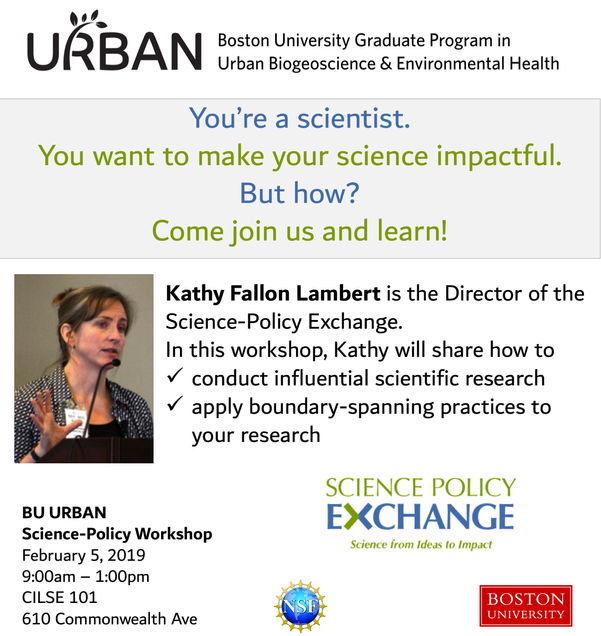Science Policy Workshop – February 5, 2019
Trainees in the BU URBAN program want their research to go beyond the boundaries of the Boston University campus research labs. Why? These remarkable Ph.D. students work on environmental challenges in cities that can impact how communities deal with heat waves, what air people breathe, how people living along shorelines can protect themselves from sea level rise, and which strategies communities can use to protect themselves from diseases like lyme. The common thread among these topics? The scientific knowledge gained from these studies can inform policy decisions.
On February 5, 2019 we invited Kathy Fallon Lambert from the Science Policy Exchange to hold a half day workshop to introduce a process model that takes a research idea from the front end development through the analysis and synthesis to the final products and outreach. Kathy coined this model the ECO model for Engagement, Co-Production, and Outreach. While students were well versed in carrying out the analysis and synthesis portion of the 3-step process model, it was the stakeholder engagement and outreach portions of the process that garnered a lot of attention. Kathy gave an overview of her own experiences and emphasized how important it is to engage with stakeholders from the beginning of a project. Her tips and tricks on how to maximize the impact of the product by strategically thinking about outreach approaches while ensuring integrity were additional highlights.
After a short break, trainees were assigned to breakout groups to work through the ECO model and apply it to hypothetical projects. The project descriptions were selected based on student feedback during the sign up process for the workshop and set the stage for discussion. The themes were:
Stormwater – How should a green infrastructure system be designed to improve both stormwater management and community health & well-being in Boston?
Water Quality – Is it necessary to decrease the allowable “Total Maximum Daily Load” or TMDL for nutrients in surface waters to reduce the frequency and extent of harmful algal blooms in the face of climate change, and what would be the associated ecosystem and health benefits?
Transportation – What are the health and ecosystem benefits of alternative MA transportation plan scenarios?
Health hotspots to green zones – How can health impact hotspots be identified and what policies or actions can convert them to healthy green zones (any city)?
Each student group reported back on their ECO model strategies and described their approach in engaging potential stakeholders (part of the Engagement portion), outlined how and when co-production of ideas would move the project aims forward, and gave a practice pitch to media outlets (part of the Outreach portion).
